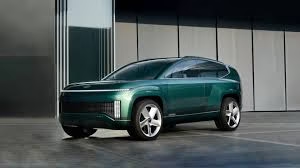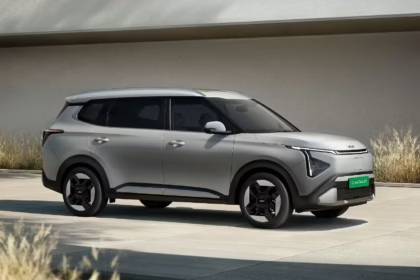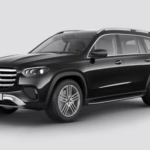Introduction
India’s electric SUVs industry is gathering momentum, and the subcompact SUV segment is leading this shift. With fuel prices on the rise, growing environmental awareness, and the government as a firm pillar of support, Indian consumers are increasingly shifting towards electric mobility. Subcompact SUVs have become the ideal choice for EV adoption in India due to a combination of their functional appeal, commanding driving position, ample interior space, and road-friendly size.

Hyundai and Kia have developed an ambitious strategy for electric SUVs. The new EVs are designed to offer weekday city driving or weekend highway excursions. Hyundai and Kia are poised to introduce electric SUVs to Indian roads that meet the country’s specific standards, climate, and family needs.
- Small electric SUVs have become the most sought-after EV segment in India.
- Hyundai & Kia are targeting 6–7 new EV SUV releases in India between 2025 and 2026.
- They will look to make these models affordable, range-friendly, and feature-rich.
- Ideal for Indian consumers seeking family-friendly, frugal, and tech-savvy options to petrol/diesel SUVs.
- Suitable for city and intercity commuting, thanks to their compact size, adequate ground clearance, and charging capabilities.
Hyundai’s Upcoming Compact Electric SUVs
Hyundai is preparing to electrify its most successful SUV lineup in India by 2025–26. Riding on the success of the ICE segment, Hyundai is set to launch EV models of the Creta, Venue, and a new urban EV based on the Casper. These cars are being planned to provide a broad range of choices — from super-low-cost city runabouts to loaded-up, long-range SUVs.
The Hyundai Creta EV, due in mid-2025, will be the flagship offering in this segment, boasting a range of 500 km and features such as ADAS, connected infotainment, and Vehicle-to-Load (V2L) charging. The Casper EV, on the other hand, will appeal to city-dwelling buyers wanting a compact, affordable EV with intelligent features and a range adequate for daily use. For those in between, the Venue EV is being tested as a mid-size compact electric SUV, offering a range of ~400 km and utility-friendly dimensions for both city and highway driving.
- Hyundai Creta EV
- Mid 2025
- Compact SUV (Creta-based)
- 450–500 km (real-world)
- ADAS, V2L support, extensive infotainment, OTA updates
- Rs 22–25 lakh (ex-showroom)
- Late 2025 (Rumoured)
- Micro-compact urban SUV
- 250–300 km
- Bright cabin, parking tech, digital cluster
- Rs 10–12 lakh (ex-showroom)
- Early 2026
- Sub-4m Compact SUV
- Around 400 km
- Touchscreen infotainment, six airbags, wireless tech
- Rs 16–18 lakh
Kia’s Upcoming Compact Electric SUVs
Kia is making an aggressive push into the Indian EV market with a rugged, boxy look and lifestyle-oriented appeal. The Clavis EV is expected to offer a 400–450 km range and a competitive price tag of Rs 14–17 lakh, positioning it against the Tata Nexon EV and future Mahindra BE variants: the Kia Sonet EV, a battery-electric variant of the company’s top-selling compact SUV. The Sonet EV will retain the city-friendly size and sporty look of its ICE counterpart, but offer an electric range of approximately 350–400 km, suitable for daily usage and weekend outings.
The top-of-the-line Kia compact EV is the Kia EV3, which has just been unveiled worldwide and is expected to launch in India around late 2025. Based on the superior E-GMP Lite born-EV platform, the EV3 features a cutting-edge cabin, eco-friendly materials, and a range of up to 500 km (WLTP). It’s designed to introduce Kia’s global electric innovation to India, with some localization in terms of design and features. All three models together will address a wide range of Indian purchasers — from pragmatic city dwellers to technology-savvy premium EV enthusiasts.
- Launch Timeline: Early 2025
- Segment: Compact lifestyle EV SUV
- Expected Range: 400–450 km
- Modified ICE platform
- Boxy, rugged look for city + offbeat charm
- Rs 14–17 lakh (ex-showroom)
- Kia Sonet EV
- Reveal in 2025
- Sub-compact electric SUV
- 350–400 km
- Sporty posture, sophisticated infotainment, safety tech
- Suited for city + intercity usage
- Rs 13–16 lakh (estimated)
- Kia EV3
- India Launch Date Timeline: Late 2025
- Platform: Born EV (E-GMP Lite)
- Anticipated Range: up to 500 km (WLTP)
- Features: Global design, digital cockpit, eco interiors
- India Version: Expected to be localized for cost, charging, and roads
- Anticipated Price: Rs 22–25 lakh (anticipated, ex-showroom)
Hyundai-Kia EV Architecture Insight
Hyundai and Kia are strategically utilizing two platforms to hasten their electric SUV launch in India — the e-GMP born-EV platform and ICE-to-EV conversion platforms. Although world models such as the Kia EV6 and the soon-to-launch EV3 are developed on the e-GMP platform (specifically for EVs), several India-centric models — including the Creta EV, Clavis EV, and Sonet EV — will likely be developed on modified internal combustion platforms. By doing this, both brands save costs and accelerate time-to-market, which is crucial in competing in India’s price-sensitive niches.
Hyundai-Kia is collaborating to develop a new, localized EV-specific platform optimized for Indian driving conditions, road infrastructure, and customer requirements. This architecture will help maximize battery packaging, enhance range efficiency, and provide scalable modularity for various SUV body styles under Rs 20 lakh.
EVs will be done at their Sriperumbudur (Tamil Nadu) and Anantapur (Andhra Pradesh) plants, both of which are being modified for EV production and battery assembly. Infrastructurally, Hyundai and Kia are aggressively collaborating with third-party players and oil PSUs to develop a robust charging ecosystem, including DC fast-charging locations along highways and in urban centers. Most of their future EVs will have 50 kW to 150 kW DC fast charging capability, which means faster top-ups and improved long-distance drivability.
Two Platform Strategies:
- E-GMP for luxury EVs such as EV3, EV6
- Modified ICE Platforms for mass-market EVs.
India-Specific EV Architecture in the Works:
- Modular, scalable, and cost-reduced
- Built to accommodate compact SUVs with high ground clearance
Local Manufacturing Hubs:
- Hyundai: Sriperumbudur, Tamil Nadu
- Kia: Anantapur, Andhra Pradesh
- Battery pack assembly & localization to minimize cost
Charging Infrastructure Plans:
- Strategic partnerships with BPCL, IOCL, and private CPOs
- Support for fast charging (50–150 kW DC) in all EVs
- Home charging + V2L (Vehicle-to-Load) feature in some variants
Competitive Landscape
| Feature / Model | Hyundai Creta EV | Kia EV3 | Tata Nexon EV | Mahindra BE.05 | MG ZS EV |
| Expected Launch | Mid 2025 | Late 2025 | Already Launched | Early 2026 | Already Launched |
| Range (Claimed) | 450–500 km | Up to 500 km (WLTP) | 465 km (MR) | 450–500 km (est.) | 461 km |
| Platform Type | ICE Conversion | Born EV (E-GMP) | ICE Conversion | Born EV | ICE Conversion |
| Price (Rs, Ex-showroom) | Rs 22–25 lakh | Rs 22–25 lakh | Rs 15–19 lakh | Rs 22–25 lakh | Rs 18–24 lakh |
| Charging (DC Fast) | 50–100 kW (est.) | 100–150 kW | 30–50 kW | 80–100 kW | 50 kW |
| Interior Features | Connected car tech, ADAS, V2L | Dual screens, eco materials | 10.25” screen, ventilated seats | Futuristic cockpit, AR HUD | Premium layout, panoramic sunroof |
| Warranty & Support | 8 yrs/160,000 km (est.) | 8 yrs/160,000 km (est.) | 8 yrs/160,000 km | Likely same | 8 yrs/160,000 km |
| Unique Advantage | Mass-market trust + tech | Global tech + born EV design | Value-for-money, widespread adoption | Bold design, MEB-like platform | Early mover in premium EVs |
Are These EVs Worth Waiting For?
Hyundai and Kia’s new electric SUVs are emerging as among the best-rounded EVs for Indian consumers in 2025–26, boasting features such as ADAS, connected technology, quick charging, and up-to-date infotainment, which positions them to offer significantly more value than most alternatives available today. More significantly, they are designed for Indian driving conditions, with high ground clearance, effective air conditioning systems for hot weather, robust suspensions, and generous boot space for families.
Hyundai-Kia’s vast service network and lengthy battery warranties mean owners can also look forward to long-term reliability and good resale value — something still in question with most new EV start-ups. These EVs will also seamlessly integrate into India’s growing EV ecosystem, offering public DC fast charging support, home charging, and even V2L (Vehicle-to-Load) capabilities in some models. For prospective buyers planning a transition to EVs within the next 12–18 months, these Hyundai-Kia models are well worth the wait — combining global technology with Indian pragmatism.
- Affordable Yet Premium: Rs 10–25 lakh, class-leading features
- India-Tailored Design: Designed for rough roads, a hot climate, and family use
- Service & Resale Confidence: Supported by Hyundai-Kia’s robust after-sales presence
- EV Ecosystem Ready: Fast charging, V2L support, and smart home charging capabilities
- Versatile Lineup: From city runabouts (Casper, Clavis) to long-range SUVs (Creta EV, EV3)
Final Thoughts
India’s EV transition is picking up pace fast, and Hyundai and Kia are undoubtedly leading the way in this revolution — particularly in the compact SUV segment, which is the sweet spot for Indian buyers. With their diversified portfolio expected between 2025 and 2026, both companies are merging world innovation with India-centric functionality. These future electric SUVs aren’t merely about checking the “EV” box — they are engineered with actual Indian driving conditions in mind: high ground clearances for rough roads, efficient cooling systems for harsh weather, compact footprints for navigating city traffic, and flexible interiors for families. They also introduce global-level technologies such as ADAS, V2L, fast charging, and high-end digital dashboards, which are typically absent in low-cost Indian EVs.
Hyundai and Kia’s commitment to domestic manufacturing. As a daily driver battling metro traffic or an individual who needs to hit the road on weekends with relatives, these EVs vow to deliver performance, reliability, and sophistication without compromise. With their futuristic features, strategic pricing, and trust in brands, the 2025–26 Hyundai and Kia compact electric SUVs are not merely launches to keep an eye on — they’re nascent market leaders in the making.
FAQs
- What is the expected Range of the Kia EV3 in India?
The globally unveiled Kia EV3 offers a range of up to 500 km (WLTP), and the India-specific model is expected to return approximately 450 km of real-world Range, subject to battery variant and usage conditions.
2. Will the Hyundai Venue EV be affordable?
The Hyundai Venue EV is going to be a mid-range compact electric SUV, priced below the Creta EV. It’s targeted at price-sensitive urban customers seeking a feature-packed electric vehicle under Rs 18 lakh.
3. Which is the cheapest of the Hyundai-Kia compact EV SUVs?
The Hyundai Casper EV and Kia Clavis EV will be the most affordable options, priced at Rs 10–14 lakh (ex-showroom), making them ideal for city-centric daily usage.
4. Do Hyundai-Kia EVs have fast-charging capability?
Hyundai and Kia electric SUVs will be capable of accepting DC fast charging in the 50 kW to 100 kW range, enabling faster refueling from public stations and longer, more usable travel distances.




